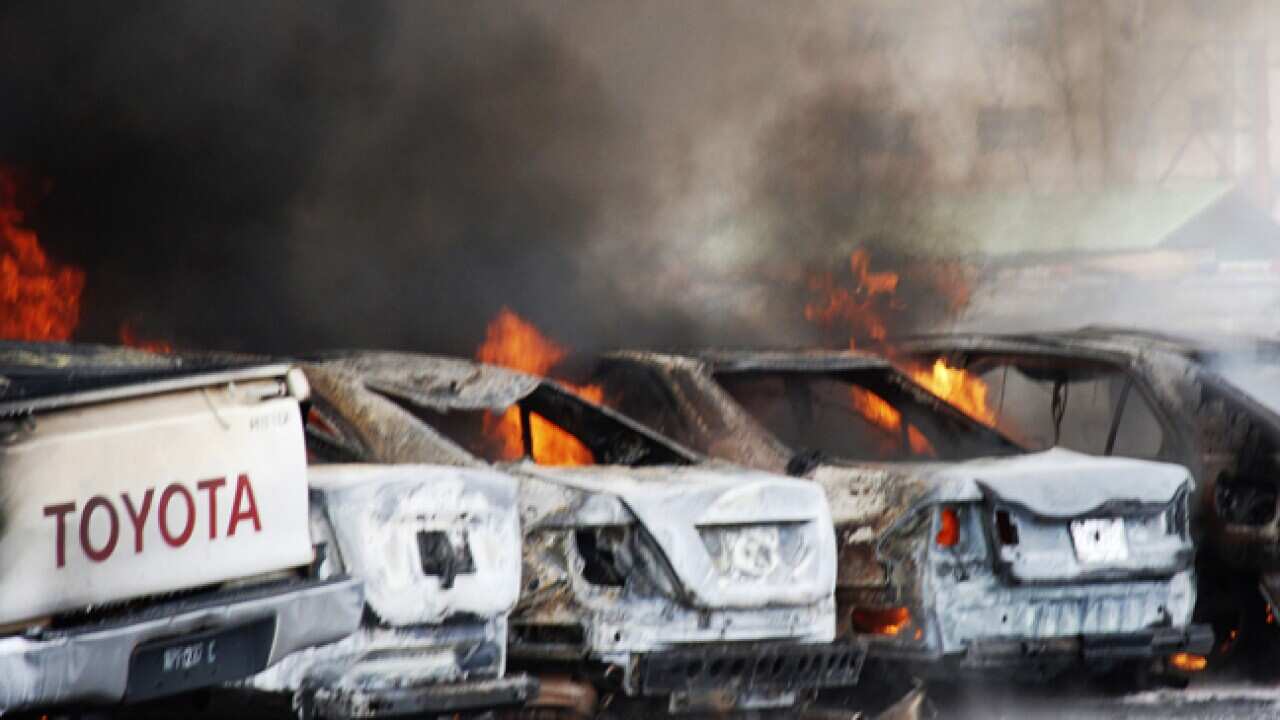A bomb attack on Nigeria's police headquarters killed two people including a policeman Thursday, officials said, in what is believed to the first suicide bombing by Islamist extremists in Africa's most populous nation.
There was no immediate claim of responsibility for the blast.
But police blamed Nigerian Islamists who a day earlier had threatened to step up a campaign of violence that has already seen scores of deadly attacks.
The bomb tore through a car park at the police compound in the capital Abuja, throwing people to the ground and destroying nearly three dozen vehicles, witnesses and officials said.
Police said the bomber drove into the car park and set off the bomb when police were about to search his car.
"The police force headquarters has been bombed," deputy national police spokesman Yemi Ajayi told AFP by telephone.
The headquarters is less than a kilometre (mile) from the presidential offices and residence.
BOKO HARAM SUSPECTED
National police spokesman Olusola Amore later said that it was a suicide attack believed to have been carried out by a radical Islamist sect.
"Definitely we are suspecting a group that goes by the name Boko Haram who have been issuing threats upon threats for which the police are rising up to that challenge," he said.
If confirmed, this would be the first such bombing in Nigeria as the country of 150 million people faces a growing threat from Islamic militants, security experts said.
Expert Peter Sharwood-Smith, a country manager for Cussac Nigeria told AFP that prior to the attack, "There has never been an intentional suicide attack in Nigeria".
At least five people were admitted to hospital for wounds from the explosion and two treated at the scene, senior Red Cross official Umar Abdul Mairiga said.
"Our volunteers were able to pick up pieces of human remains. These have been sent for examination by police forensic experts," he said.
A man in an apartment opposite the compound said he saw blood-stained people on the ground after the blast.
There were several explosions, he added, speaking on condition of anonymity.
"There was a loud bang, my whole house shook as if the roof was about to come down. Then there was another blast," he said.
Abdul Mahmud, who was at a nearby office complex, said: "It was confusion everywhere. People running helter skelter."
Police said 33 vehicles were destroyed and 40 damaged.
'JIHAD COMING SOON': GROUP
The explosion, the latest in a series of blasts in recent months, comes after Boko Haram on Wednesday threatened "fiercer" attacks, saying it was angered by a police declaration that its days are "numbered".
"Very soon, we will wage jihad (holy war)," the group said in a handwritten statement distributed in the northeastern city of Maiduguri.
The sect admitted links with a foreign Islamist group connected to Al-Qaeda, but security experts earlier speculated that it had established ties with Islamists in north Africa. It said some of its members had just returned from training in Somalia.
The group, whose name means Western education is sin, launched an uprising in 2009 which was put down by a brutal military assault that left hundreds dead.
It has pushed for the creation of an Islamic state and been blamed for shootings of police and community leaders, bomb blasts and raids on churches, police stations and a prison.
Police said another bomb exploded near a church Thursday killing four children in northern Nigeria where the Islamic militants are blamed for a spate of attacks in the area.
President Goodluck Jonathan last week told reporters in New York that he would support attempts to talk to the Islamic militants in the predominately Muslim north to end the deadly unrest.
Senate president David Mark said security forces had to "rise up to the challenge" and "look inwards" to end the spate of wave of attacks.
In other major attacks in the capital in recent months, twin car bombings at Independence Day festivities on October 1 killed 12 people.
New Year's Eve blasts at a beer garden left several dead, and more were killed in a spate of bombings near the city and in the north after Jonathan's inauguration about two weeks ago, after April elections.

